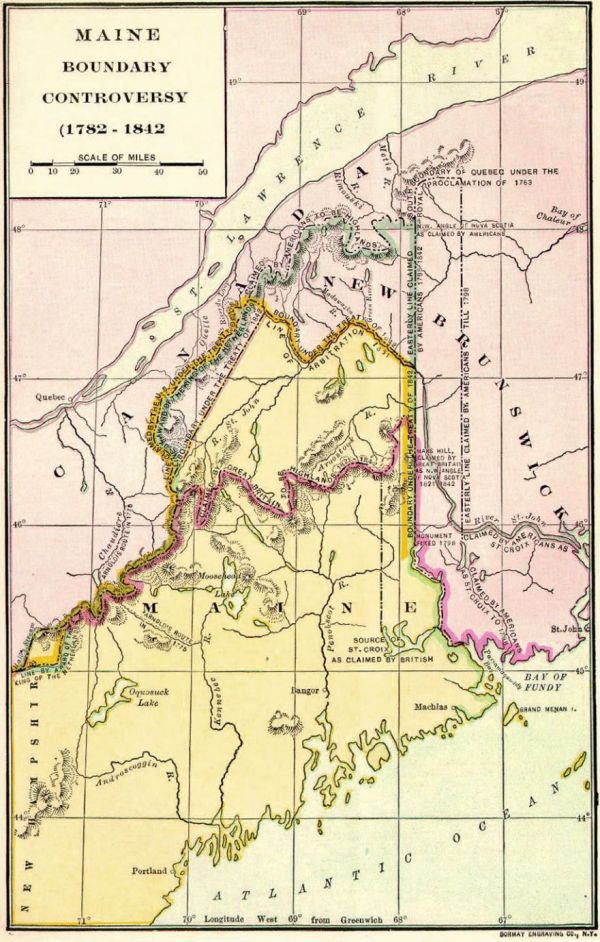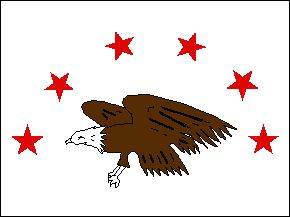A Short-Lived Nation on the US-Canadian Border
Do you remember the Indian Stream Republic?
It was a tiny, short-lived nation that formed in the Eighteenth Century
on the ambiguous border between the United States and British Canada.
It wasn't the only one.
 The border between New Hampshire and Quebec established by the 1783 Treaty of Paris was vague, but Maine had an even rougher time. Maine fit into these boundaries:
The border between New Hampshire and Quebec established by the 1783 Treaty of Paris was vague, but Maine had an even rougher time. Maine fit into these boundaries:
 In
1817, a group of American settlers moved into the area immediately
north of the Saint John River. 10 years later, one of their leaders, John Baker, raised a flag
designed by his wife and declared the founding of the Republic of
Aroostook. A British official hauled it down. Neither, thankfully,
resorted to violence.
In
1817, a group of American settlers moved into the area immediately
north of the Saint John River. 10 years later, one of their leaders, John Baker, raised a flag
designed by his wife and declared the founding of the Republic of
Aroostook. A British official hauled it down. Neither, thankfully,
resorted to violence.
In the meantime, specifically in 1820, Maine was admitted into the union as a state. The state government was committed to enforcing its interpretation of the treaty boundaries—which included John Baker’s settlement north of the Saint John River. This region became known as Madawaska.
Maine sent in a census official to count the inhabitants. British officials arrested him. Maine then called up its militia and marched in. British officials responded in kind.
At that point, to prevent Maine from doing anything rash, the United States government took control. General Winfield Scott of the US Army moved troops into the area and took personal command of the situation. The so-called Aroostook War was, as a result, a bloodless confrontation. The Webster-Ashburton Treaty of 1842 resolved the border dispute by dividing the area between the two nations.
In a legal or practical sense, Republic of Madawaska never existed. But it does live on in popular memory, especially in modern Madawaska County, which is the westernmost portion of New Brunswick. James L. Erwin writes:
 Flags flown in Edmundston, Canada. From left to right: the Republic of Madawaska, France*, New Brunswick and Canada.
Flags flown in Edmundston, Canada. From left to right: the Republic of Madawaska, France*, New Brunswick and Canada.
*With a slight modification. Can you spot it?

from the Northwest Angle of Nova Scotia, viz., that Angle which is formed by a Line drawn due North from the Source of St. Croix River to the Highlands; along the said Highlands which divide those Rivers that empty themselves into the river St. Lawrence, from those which fall into the Atlantic Ocean, to the northwesternmost Head of Connecticut RiverGot that? Because if you do, you would have been a big help to diplomats on both sides of the border two centuries ago. One of the problems was that the "Highlands" that the treaty describe are geographically nebulous. The people of the District of Maine were especially sensitive about the issue, as half of their region was conquered and colonized by the British during the War of 1812.
 In
1817, a group of American settlers moved into the area immediately
north of the Saint John River. 10 years later, one of their leaders, John Baker, raised a flag
designed by his wife and declared the founding of the Republic of
Aroostook. A British official hauled it down. Neither, thankfully,
resorted to violence.
In
1817, a group of American settlers moved into the area immediately
north of the Saint John River. 10 years later, one of their leaders, John Baker, raised a flag
designed by his wife and declared the founding of the Republic of
Aroostook. A British official hauled it down. Neither, thankfully,
resorted to violence.In the meantime, specifically in 1820, Maine was admitted into the union as a state. The state government was committed to enforcing its interpretation of the treaty boundaries—which included John Baker’s settlement north of the Saint John River. This region became known as Madawaska.
Maine sent in a census official to count the inhabitants. British officials arrested him. Maine then called up its militia and marched in. British officials responded in kind.
At that point, to prevent Maine from doing anything rash, the United States government took control. General Winfield Scott of the US Army moved troops into the area and took personal command of the situation. The so-called Aroostook War was, as a result, a bloodless confrontation. The Webster-Ashburton Treaty of 1842 resolved the border dispute by dividing the area between the two nations.
In a legal or practical sense, Republic of Madawaska never existed. But it does live on in popular memory, especially in modern Madawaska County, which is the westernmost portion of New Brunswick. James L. Erwin writes:
In New Brunswick, each Mayor of Edmondston is recognized as the honorary President of the Republic, and a flag is hoisted to commemorate Madawaska during an annual Acadian festival. To the south, however, Maine residents fly the old Acadian flag. It is a sign of Madawaska’s complicated identity that Americans salute an Acadian flag while French Canadians salute a flag first hoisted by American separatists.
*With a slight modification. Can you spot it?

No comments:
Post a Comment